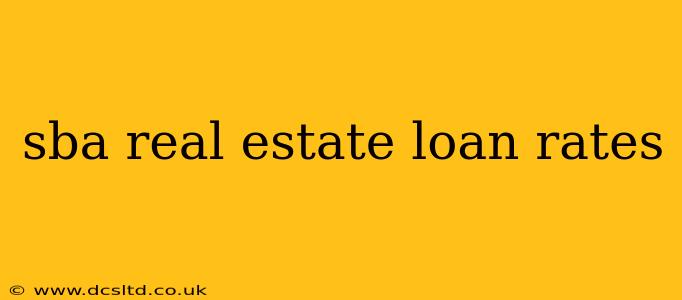Securing financing for real estate ventures can be challenging, but the Small Business Administration (SBA) offers valuable loan programs to assist small business owners. Understanding SBA real estate loan rates is crucial for navigating this process effectively. This guide will delve into the intricacies of these rates, helping you make informed decisions about your financing options.
While the SBA doesn't directly set interest rates, it works with lenders to provide guaranteed loans, making them more appealing to borrowers. This backing reduces the risk for lenders, often resulting in more favorable terms than conventional loans. However, the actual rate you'll receive depends on various factors, making it impossible to provide a single, definitive number.
What Factors Influence SBA Real Estate Loan Rates?
Several factors contribute to the final interest rate you'll receive on your SBA real estate loan:
- The Prime Rate: This benchmark interest rate, set by major banks, significantly impacts SBA loan rates. Fluctuations in the prime rate directly influence the rates lenders offer.
- Your Credit Score: A higher credit score demonstrates lower risk to the lender, typically leading to a lower interest rate. A strong credit history is essential for securing favorable terms.
- Loan Term: Longer loan terms generally come with higher interest rates, as the lender assumes more risk over a longer period.
- Loan-to-Value (LTV) Ratio: The LTV ratio compares the loan amount to the property's appraised value. A higher LTV ratio (meaning a larger loan compared to the property's value) often results in a higher interest rate due to increased risk for the lender.
- The Lender: Different lenders have varying underwriting criteria and risk tolerance, leading to differences in interest rates. Shopping around and comparing offers from multiple lenders is crucial.
- Type of Property: The type of real estate being purchased (e.g., commercial, residential) can also influence the interest rate. Some property types may be considered riskier than others.
- Down Payment: A larger down payment generally translates to a lower interest rate because it reduces the lender's risk.
What are the Different Types of SBA Real Estate Loans?
The SBA offers several loan programs that can be used for real estate purchases, each with its own eligibility requirements and potential interest rate variations:
- 7(a) Loan Program: This is the most common SBA loan program, offering financing for a wide range of purposes, including real estate acquisition, construction, and renovation.
- 504 Loan Program: Designed for larger projects, the 504 loan program is often used for purchasing commercial real estate and major equipment.
How Can I Get the Best SBA Real Estate Loan Rate?
Obtaining the most competitive rate involves proactive steps:
- Improve your credit score: Before applying, work towards improving your creditworthiness.
- Shop around: Compare offers from multiple lenders to find the best terms.
- Prepare a strong business plan: A well-prepared business plan demonstrates your financial stability and increases your chances of securing a favorable rate.
- Make a substantial down payment: A larger down payment reduces the lender's risk and often leads to a lower interest rate.
- Negotiate: Don't hesitate to negotiate the terms of the loan, including the interest rate.
What are the Current SBA Real Estate Loan Rates?
Unfortunately, providing exact current rates is impossible. Interest rates are dynamic and change frequently based on market conditions. To obtain the most up-to-date information, you must contact several SBA-approved lenders directly and request quotes based on your specific circumstances.
Are there fees associated with SBA real estate loans?
Yes, there are typically fees associated with SBA loans, including closing costs, origination fees, and potentially guarantee fees. These fees vary depending on the lender and the loan amount.
What are the eligibility requirements for an SBA real estate loan?
Eligibility requirements depend on the specific SBA loan program. Generally, you'll need a good credit history, a viable business plan, sufficient collateral, and a demonstrated ability to repay the loan. Specific requirements can be found on the SBA's website or through consultation with a lender.
Securing an SBA real estate loan requires careful planning and research. By understanding the factors influencing rates and taking proactive steps to improve your financial profile, you can significantly increase your chances of obtaining favorable terms and achieving your real estate goals. Remember to consult with financial professionals and lenders to determine the best loan option for your specific situation.
